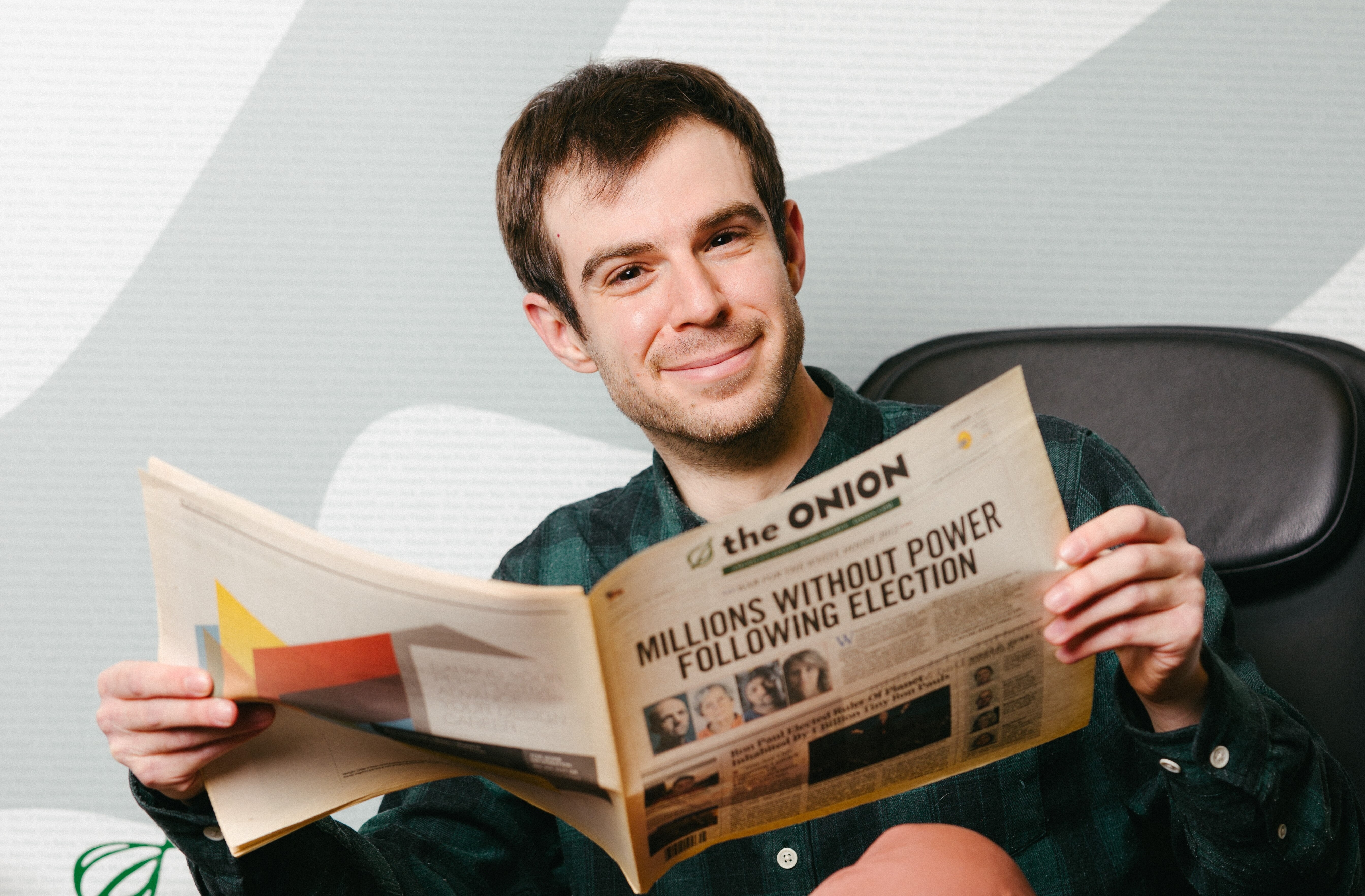The Onion’s head writer takes satire very seriously: “Our mandate is just to be funny”

Mike Gillis, head writer of the satirical site The Onion
For over three decades, The Onion, which describes itself as ‘America’s Finest News Source’, has also been the number one source of fake news in the country. The satirical media company has decades of providing biting commentary on real current events while parodying the tone and style of traditional media.
Founded in 1988 by two students at the University of Wisconsin-Madison as a weekly print paper, The Onion has successfully navigated the media industry without losing its wit: from the demise of print to the overreliance on social media, and then to an era where the line between satire and real-life is perhaps more blurred than ever before.
The paper now has more than 24 million followers across all its social channels, and recently announced it will relaunch its print offering as a perk for paying members. This is part of an ongoing trend where niche publications are reviving their print offerings from the dead with Vice, SPIN, and Nylon being a few examples. It is also a reflection of a shift in The Onion’s business model, which used to depend entirely on digital advertising and is now focusing on a mix of partnerships and a membership programme. Asked about their current revenue, the newspaper’s leadership declined to disclose any figures for this piece.
On the eve of the US election, I spoke with The Onion’s head writer Mike Gillis about the state of print journalism, joking about politics, artificial intelligence, and the role of satire today. Our conversation was lightly edited for clarity and length.
Q. What do you see is the relationship between satire and journalism?
A. Satire is a powerful tool for stepping outside some of the biases and spins that journalism can have, and particularly in the political world that’s a real problem.
Satire is sort of a rhetorical mode that presents an entertaining, maybe persuasive, argument for a particular perspective, which is generally: “This thing is dumb, here's why.” In the case of journalism, what is dumb about journalism? What's dumb about the world of politics? Hopefully, we do that in a funny, exciting, surprising way.
Q. Do you see what you guys do as a form of journalism?
A. I don’t and I don’t think a lot of us think of ourselves that way. We think of ourselves as comedians or entertainers.
Someone pretentious might say we’re artists – I would not say that. We are trying to do something that’s separate in an important way. We can't really think of ourselves as doing some kind of civic service. If you do that, it takes the air out of the act of satire and makes what we’re doing a little bit more stodgy and forced and stilted, and what we are trying to do is much smoother and much closer to entertainment or art.
Q. How are you guys looking at this year's presidential election?
A. One way of looking at that is looking at what would make for effective, surprising satire. The thing that would not make what we are doing effective is if we were kind of regurgitating talking points or acting as agents of propaganda or punditry. That would turn a lot of people off.
What we are trying to do is deliver our genuine idea of what a funny and surprising piece of writing is. It doesn’t really distinguish it in too significant a way from what we typically do.
A fringe benefit of a lot of what we write is that it draws attention to particular issues. If we have any effect on political discourse, it’s sometimes shedding light on something that maybe a traditional outlet might not be able to cover or might not be able to cover in an interesting way.
Q. Any examples of that?
A. In the case of the recent Lieutenant Governor scandal in North Carolina, we are just trying to write something that’s punchy and interesting about that. But, in the 10,000 droplets that make an ocean of potential sea changes – to do a very convoluted metaphor – that might actually have an effect on making a few more people aware about what's going on in politics and this might have an effect on people who might not be paying attention to traditional news outlets in the same way.
Q. What is your mandate when it comes to making jokes at the expense of both sides of the political spectrum?
A. Our mandate is really just to be funny. Our Latin motto is ‘Tu Stultus Es’, which means ‘you are dumb’ and dumbness exists regardless of partisan affiliation. So we are always going to be covering the corruption and stupidity of conservatives and progressives and anarchists and libertarians, and all sorts of stupidity that exists regardless of ideology.
That's a genuine point of pride: we don’t come in saying what would be best for this movement or what have you. None of us regard ourselves as pundits. We are here to be funny and creative and hopefully surprise the reader in various ways.
Q. Would you say you have benefited from the Trump era as a source of comedy?
A. I don’t think so. What Trump is able to do very well is operate in the same rhetorical mode as a stand-up club comedian. He can recognise the silliness of his persona and get up on stage and say the thing that a politician shouldn’t say, and the crowds go crazy for that.
He’s not just puncturing the sanctity of the Washington establishment. He’s puncturing his own sanctity, and that’s tough, because then we are almost in the role of a heckler, which is a much less funny role than the person on stage. In a lot of cases, it feels like he will get to the self-commentary that we would traditionally impose on a less rhetorically gifted politician or somebody who’s less willing to puncture their own sanctity.
So I don’t know if we profited off of it. It was not necessarily the most fun era. But, like most reporters, we figured out a way to cover Trump that was interesting and new, and not rely on what we did before.
Q. Have you encountered any problems or controversies when joking about any political issues?
A. Because the internet exposes so much of what we publish to the wider world, people who wouldn’t necessarily be looking at The Onion otherwise are not viewing something we do in the context of everything else that we publish, which is a lot of silly stuff.
We have a lot of average observational stuff. People can take whatever their hobby horse is and see that we have joked about it and say, ‘Well, I’m all for a joke, but this particular issue that I care about vehemently and would shed blood over, how dare you.’ And that ranges from deities that we’ve mocked – people get very angry about that and threaten us sometimes to our faces – to something like Taylor Swift. Pitbull people get absolutely, apoplectically angry if we say something about pitbulls being violent.
So yeah, unfortunately, that's just part of what happens when you put your writing on the internet and have a large audience. But we do talk about it a lot and think really deeply about how a reasonable reader will react to this as a joke or feel as if we are personally attacking them for no real satirical purpose.
Q. Are there limits or lines that you are unwilling to cross in terms of comedy or making fun of something?
A. I don’t think there are topics that are off limits. It’s always just how we cover them, and the dictum is usually, "don’t punch down, but punch up." So we are hopefully trying to be on the side of people who are suffering at the hands of powerful forces, rather than otherwise, because we never want to be in the role of bullying someone that’s just an average person.
Q. With the advent of AI, a lot of publications are worried about what this means for them. As a satirical publication, and humour being very “human”, do you feel protected from this AI revolution that is stirring up a lot of media companies?
A. The point of a lot of art and entertainment is to hear a very particular perspective and to feel like you are part of a community – maybe have like-minded people or maybe people you disagree with, but you want to hear their opinion. People come to us to see what The Onion has to say about a particular topic, how they are approaching it or how they are playing with it in an interesting way.
I don’t think AI can do that, because AI is representing this kind of vortex of hell of voices that have been amalgamated into a single chatbot that's hiding behind this mask of being one persona. So I don’t really see AI as a threat, but I think it’s interesting. It can do some cool stuff with coding, for example. But in our case, we aren’t really thinking about it too directly.
Q. In a sense you guys are actually turning away from technology as you recently decided to re-launch your print newspaper. Why?
A. Part of it is what I was just describing: this sense of our jokes being fractured across the Internet. Reading The Onion in print, we all agreed, was the best way to enjoy it and understand what we were doing, so we wanted to get back to that. We also received an enormous amount of interest from readers in getting a print edition, So it made sense, both from a creative and business perspective.
We also wanted to switch from a business model that was oriented towards ads, Taboola, SEO and all the stuff that dominated the past couple of decades of journalism in general, and instead move towards something that provided a really high-quality product made by people who care about it, that did not condescend to the reader, and that was not hellish to read, which is the case with so many websites that are just covered in ads.
The other side of that was this sense that a lot of people are fed up with consuming stuff in social media, in that whirlwind of voices, and really wanted to move back towards a place where the Internet kind of was in the 1990s and early 2000s of going to a website deliberately. This idea that I am not going to be infuriated by it because I know this is something that I personally vibe with and we thought a print edition was a good way to kind of build a foundation of that community of like minded people.
Q. What are your future editorial plans? Have you thought about perhaps an international expansion?
A. Because The Onion has such a particular voice, we would have to have really trusted partners and we would want to have people who really understood wherever we were writing about so I think that that makes it a little hard.
The great thing about The Onion’s voice is that it’s very able to accommodate whatever culture throws at it. As we went from being a college newspaper to a tabloid parody to one of the first print publications to transition into a website to doing 24/7 news and TV shows, it’s always expansive enough that it can cover a particular medium. Basically, wherever you see people being dumb, The Onion will be there in the future.
In every email we send you'll find original reporting, evidence-based insights, online seminars and readings curated from 100s of sources - all in 5 minutes.
- Twice a week
- More than 20,000 people receive it
- Unsubscribe any time
signup block
In every email we send you'll find original reporting, evidence-based insights, online seminars and readings curated from 100s of sources - all in 5 minutes.
- Twice a week
- More than 20,000 people receive it
- Unsubscribe any time




